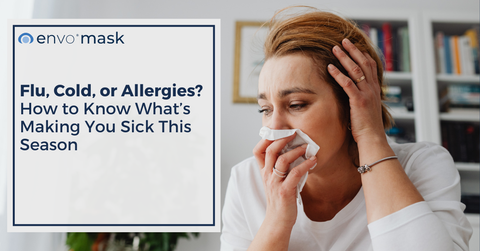news
Short and Long-Term Health Effects of Air Pollution

Why Air Quality Matters
The air we breathe affects every part of our health — not just our lungs. Air pollution comes from many sources: vehicle exhaust, factories, wildfires, dust, and more.
The smallest particles, called fine particulate matter (PM2.5), are especially dangerous because they can travel deep into your lungs and even enter your bloodstream. Over time, this kind of exposure increases the risk of serious health problems and premature death (EPA 2025, “Particulate Matter (PM) Basics).
In the U.S., the EPA monitors six main pollutants (like ozone and particulate matter) and shares daily air quality updates through the Air Quality Index (AQI). “Air pollution, in all forms, is responsible for more than 6.5 million deaths each year globally, a number that has increased over the past two decades,” (National Institute of Environmental Health Sciences 2025, “Air Pollution and Your Health”).
How Air Pollution Affects the Body
Short-Term Effects (Hours to Days)
- Irritation and breathing issues: Itchy eyes, coughing, or shortness of breath are common on high-pollution days. Kids, older adults, and people with asthma or COPD tend to feel these effects first.
- Heart strain: Even brief increases in pollution can cause inflammation and stress on blood vessels, slightly raising the risk of heart attacks or strokes.
- Wildfire smoke: Dense smoke can make breathing difficult and cause headaches or fatigue. Health agencies recommend staying indoors with clean air and wearing a properly fitted respirator if you must go outside.
Long-Term Effects (Months to Years)
- Heart disease: Prolonged exposure to polluted air increases the risk of heart disease, stroke, and heart failure.
- Lung disease and cancer: Breathing polluted air over time can lead to chronic bronchitis, COPD, and even lung cancer.
- Pregnancy and infants: Poor air quality has been linked to higher chances of preterm birth and low birth weight.
- Children’s development: Long-term exposure can affect brain development and learning in kids.
- Overall impact: The World Health Organization estimates that air pollution contributes to millions of premature deaths worldwide, mainly through heart and lung diseases.
Who’s Most at Risk
- Children and teens: Their lungs are still developing, and they breathe faster, taking in more air (and pollution) per minute.
- Older adults and those with heart or lung conditions: Their bodies are less able to handle added stress from pollution.
- Pregnant people and newborns: Exposure increases the risk of pregnancy complications.
- Outdoor workers and athletes: They inhale more air during physical activity, which increases exposure — especially during wildfire seasons.
What You Can Do
- Check air quality: Use AirNow or your local forecast before heading outdoors. Limit intense outdoor activity on “Unhealthy” AQI days.
- Keep indoor air clean: Close windows during smoky or polluted days and use HEPA filters or set your HVAC system to recirculate air.
- Use protection when needed: If you need to be outdoors during poor air quality, wear a NIOSH Approved® respirator (like an N95 or N99) for the best protection.
- Ensure proper fit: A respirator only works if it seals well. Always do a quick fit check and replace filters as recommended. Store it clean and dry between uses.
How envo Can Help
At envo, we believe respiratory protection should be effective and comfortable. Our masks combine high-efficiency filtration with designs that fit securely and comfortably — helping you move, work, and breathe easier when air quality takes a turn for the worse.
(Always follow local health guidance and manufacturer fit instructions.)
The Takeaway
Air pollution doesn’t just affect your lungs — it can impact your heart, brain, and overall wellbeing. The good news: by checking air quality, keeping your indoor air clean, and using proper respiratory protection when needed, you can meaningfully reduce your exposure and protect your long-term health.


